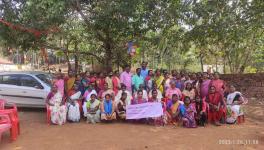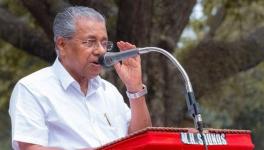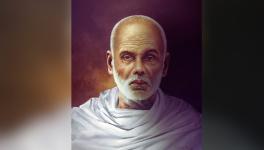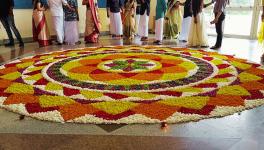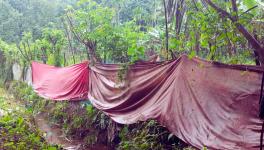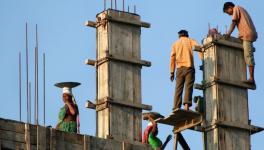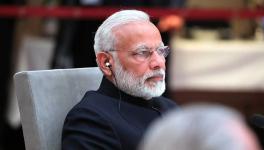Antigod’s Own Country: Counter Culture in Kerala
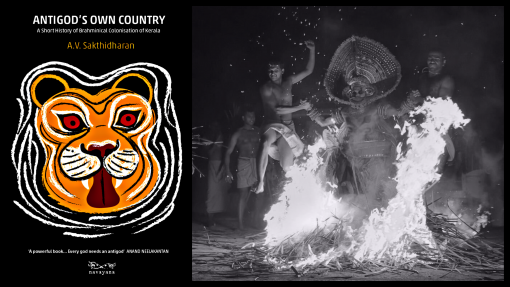
Senior journalist A V Sakthidharan's recent work 'Antigod's Own Country: A Short History of Brahminical Colonisation of Kerala' takes us to the roots of the many non-Aryan deities and myths that dot the coast of Kerala: from Malabar's Muthappan and Pottan Theyyam to Travancore's Ayyappan and Malayali's own Maveli – their very existence being a resistance against invasive Brahminism and Aryanism. Traced through a telling exploration of the peculiar socio-political contexts that birthed these local gods or 'anti-gods', the book is also a deeply political meditation on issues faced in contemporary Kerala too. The work engages with Sabarimala – a religious space from where Dalits, Adivasis and other marginalised sections are increasingly being pushed out, it remarks. The Sangh's appropriation of Ayyappan – a non-Hindu, hill-top deity – is seen by Sakthidharan as an extremely political move, which seeks to purge this space of its pro-Dalit, pro-Adivasi, pro-Muslim character. The recent controversy on the entry of women of the menstruating age into Sabarimala is also placed against this context here.
These local histories or 'little traditions' are to be carefully observed, for counter culture and its myths contain radical elements of subaltern protest against societal injustice as well as their aspirations. The excerpt below from the chapter 'Challenging Adi Sankara' of the book is on one such powerful subaltern myth popular in northern Kerala.
Challenging Adi Sankara
From Ayyappa of southern Kerala let us move to teyyam and Muttappa in the North. The word ‘teyyam’ is said to be a corrupted form of daivam (god). He is not the representation of god, he is god himself. It has come to represent the particular form of worshipping folk deities that is prevalent in Kerala. The songs sung to invoke the spirits of the deities are known as tottam songs. ‘Tottam’ is believed to be a corruption of ‘stotram’. The teyyams are a political phenomenon and Pottan is the most political of them—he challenges Adi Sankara, the brahmin acharya of advaita who also belonged to Kerala. Sankara runs into Pottan, who carried a child at his waist and a pot of toddy on his head, and asks him to get out of the way to avoid distance pollution, but the organic intellectual of the dalits retorts with a simple question: ‘Why do you ask me to move off?’ He goes on to disabuse Sankara’s mind of all notions of the latter’s cultural superiority and the sanctity of the caste system:
You smear the sandal paste
We are bathed in dirt
You wear the chains of gold
We wear the chain of fish…
Haven’t you crossed the river in the canoe which I rowed?
The banana grown in your dump yard is the offering to your god
The basil flower grown in our dump yard is the garland of your god
Still why do you argue over caste?
When you are wounded, is not it blood that gushes out?
When I, too, am wounded, is not it blood?
(Chandran 2006)
Pottan Teyyam employs the very weapon of advaita—non-duality, the oneness of being—against the proponent of that philosophical system. The philosopher realises his mistake and prostrates before the chandala who in turn blesses him. In Malayalam, the word ‘pottan’ is used for a fool but it may also refer to a deaf and mute person. For brahminical liturgy logic, reason and morality may appear foolish, but Pottan was no fool.
Like Ayyappa who admits all devotees without any distinction of caste, creed or class, teyyams do not respect the received brahminical wisdom on caste hierarchies. There are traces of Buddhism in the teyyam cult. The revolutionary tradition of teyyam is too obvious to be ignored. Ayyankali, Chattambi Swamy, Sree Narayana Guru and a host of others collectively took up the fight where Pottan Teyyam left it. The traditional mask dance of the dalits became a means to rebuke, ridicule and question the atrocities and injustices done to them. Teyyam dances and the group songs sung during the agricultural operations were a sort of inversions and defiance to the dominance of the high castes. During World War II, the Communist Party employed folk arts like teyyam, poorakkali and ottamtullal against black-marketeers and hoarders.
For the dalits, teyyam is a weapon in the struggle against the unjust social system that has marginalised them. Many teyyam stories contain criticism of untouchability and brahminism. The bulk of the two-hundred-odd teyyam artists in North Kerala are members or sympathisers of the Communist parties. The brahmins advise people to be pure and eat vegetarian food, while a teyyam god like Muthappa is all for eating meat, drinking and being jolly.
Of late there has been an intrusion of brahminical verses into the Dravidian tottam pattu—the ritual song sung during the teyyam—which is presumed to give it brahminic respectability. Palantayi Kannan, originally a tiyya martyr-deity, was Hinduised and turned into Vishnumurthy, the Vishnu avatar who devoured Hiranyakashipu. In the Hinduised version of the Sankara–Pottan face-off, the dalit disappears and in his place appears Lord Siva who blesses Sankara. The parayan victim of the caste system who advances solid arguments against caste is erased. T.V. Chandran writes: ‘[T]he subversive value of the Pottan’s voice was put under the stronghold of the ideology of high-strata Hinduism through the interpolation of a story that appears in Sankara Digvijayam, a fourteenth century work which seeks to establish the supremacy of the great Indian philosopher Sri Sankaracharya’ (Chandran 2006). According to this version, Sankara concludes that the person confronting him is no chandala but Lord Siva himself.
Donning the teyyam dress is the preserve of a host of oppressed caste devotees. The poor dalit who is teyyam today will be found slaving the next day in the landlord’s paddy field for a pittance. During the teyyam season—from December to February—colourful teyyams teem northern Kerala to the accompaniment of loud drumbeat. As with the oracle of the Bhagavati temples in other parts of Kerala, the teyyams originated in what was once Kolathunadu—Kannur and Kasargod districts of present-day Malabar.
Teyyam may have originated in the fertility cult associated with agriculture (Chandran 2006). Some scholars attribute its origin to the hero cults of the Sangam period. This ritual pageantry of North Kerala is a rare survivor of a pre-Aryan, non-brahminical religious system. It is said teyyams were tolerated as an acceptable safety valve to allow complaints against the misdeeds of the upper castes to be expressed in a ritualised and non-violent manner. During the colonial days Christian missionaries used to conduct house-to-house campaigns against teyyam and snake worship, calling them primitive and inhuman. This had a mixed response. The better-off tiyyas formed the Sree Jnanodaya Yogam to fight superstition and ended up conceding a brahminic halo to the local gods. Many oppressed communities in rural Kerala, however, had a visceral reverence for their gods and did not fall for the propaganda.
A V Sakthidharan has worked as a journalist for close to four decades and retired from The Hindustan Times in Delhi as Assistant Editor in 2006. This is his first book.
This is an excerpt from the book Antigod’s Own Country: A Short History of Brahminical Colonisation of Kerala written by A V Sakthidharan, and published by Navayana in 2019. Republished here with permission from the publisher.
Get the latest reports & analysis with people's perspective on Protests, movements & deep analytical videos, discussions of the current affairs in your Telegram app. Subscribe to NewsClick's Telegram channel & get Real-Time updates on stories, as they get published on our website.









